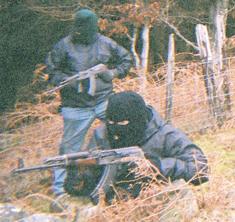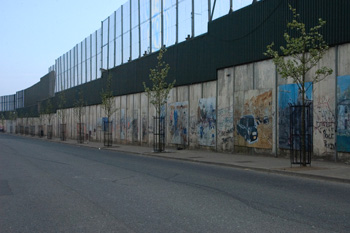The recent fatal attacks on British Army and Police Service of Northern Ireland personnel by the Real and Continuity IRA came as a shock. They are the first in 12 years. There has been plenty of evidence over the past few months that they were being planned. The rumours were that the Real IRA were trying to force the hand of the Sinn Fein leaders, by obliging them to line up with the security forces and the Police and thus to demonstrate that they had sold out the Republican cause.

The fact is, however, that the conditions which would result in these groups gaining anything from this are absent. The "armed struggle" failed to liberate one inch of land over 30 years. In fact it threw back the consciousness of the working class, dividing worker against worker, and gave the excuse for dozens of repressive laws and measures to be introduced. These laws can in fact be used against the working class, and the trade unions in particular.
These recent attacks have helped to create an environment in which anyone who disagrees with the Good Friday Agreement can be tainted as "dissidents" and thus "terrorists", when the two things are not the same at all. There are among the Republican movement those who oppose that Agreement on a class basis and reject the idea of a return to the "armed struggle".
There was a huge war weariness, which resulted in the sham of the Stormont Assembly. Stormont is nothing more than a glorified local council. The underlying tensions and the problems and contradictions in Northern Irish society have if anything got worse over the past period. The huge economic development in the Republic had a certain effect on the economy, but the six counties in the North are more divided physically by the walls and barbed wire and sectarianism has been institutionalised with the Sinn Fein and Democratic Unionist Party, officially "representing" the Catholic and Protestant communities respectively.
The attacks reflect in a distorted and confused way the frustration of a layer of young people who don't see any other way out. Their tactics won't achieve a united Ireland in another 30 or even 300 years. In the late 1960s and early 1970s the Provisional IRA was able to gain a sizeable echo among the Catholic Youth, because they were seen to be defending the communities from sectarian attacks and the British state. But even with significant support the Provisionals' campaign failed in its objectives.
The response to the attacks has been rapid and very revealing. It is very positive that the unions, under the pressure of the workers, called for demonstrations against a return to sectarian violence. Unfortunately, religious groups, MPs and ‘security forces' tried to appropriate these protests turning them into the ‘official' response. That must not be allowed to happen. That same establishment has been for centuries responsible for the oppression of workers of different denominations and the sectarian division in the North of Ireland.
For Marxists the key to transforming the situation is the organized working class. We recently saw thousands of workers from all denominations and backgrounds marching together in the South. When the workers move, there is no power on earth that can stop them.

The conditions are maturing for the building of a mass movement against capitalism. The crisis of capitalism doesn't respect religious denomination or which side of the ‘peace walls' (that separate Protestants and Catholics in Belfast) you happen to live on. Unemployment is shooting through the roof. It's doubled in the South and the ripples of the economic nightmare there will not stop until they reach the North Antrim coast.
At a time when jobs, services, houses and health are all at risk, taking pot shots at the PSNI or the Army is a dangerous diversion. How many trade unionists and young people in the North were sitting glued to the pictures of the monster demonstration in Dublin last month? How many were sitting thinking "we should be doing that"? Now they have been sitting watching the TV news reports of the shootings wondering whether the clock has been turned back 20 years.
The ideas of Marxist internationalism provide a genuine alternative to the blind alley into which the working class in the North of Ireland has been driven for so long. We base ourselves on the organised strength of the working class in the trade unions and among the youth. It is only through fighting in the tradition of Connolly and Larkin that we can hope to bring down the partition and the so called peace walls. We stand for a united Socialist Ireland, linked in a voluntary federation to a Socialist Britain as part of a voluntary European and world Socialist Federation.
Sectarianism only serves to divide the working class. When in reality the conditions that Catholic and Protestant workers face mean that they have far more in common with each other than they could ever have with the bosses. That fact alone means that there is an alternative. But Marxism needs to win the arguments and show up the shortcomings of both Paisley and Adams. That means not simply waiting for things to happen or tail ending events. On the contrary, what is required is for all genuine Marxists in Ireland to come together and work towards the building of a force that can unlock the potential power and strength of the organised working class in the whole of the island.
See also:
- Ireland: ten years on from the Good Friday/Belfast Agreement by Gerry Ruddy (April 30, 2008)
- Ireland - An Overview 1967-2007 by Gerry Ruddy (August 10, 2007)
- Ireland: Republicanism and Revolution by Alan Woods
